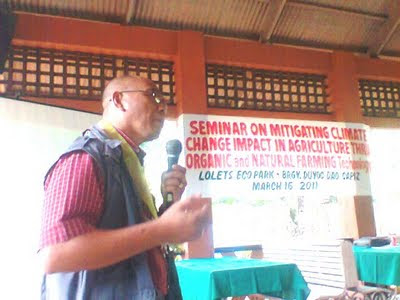By Niño S. Manaog
University Extension Associate II
Some 50 faculty members from across the Capiz State University (CapSU) System attended the Seminar-Workshop on Textbook Writing held on June 2–3, 2011 at the Conference Room of CapSU Roxas City Campus, Fuentes Drive Roxas City
 |
| BRAINSTORMING SESSIONS Science, Filipino and English faculty members pool to draft potential materials for textbook writing. |
Sponsored by the Mutya Publishing House, Inc., a publishing firm based in Malabon City
During the first-day lectures, Antonino briefed the participants on the services of Mutya Publishing House and lectured on the rudiments of textbook publication. For the major part, well-published textbook author Bernales shared on publishing techniques and the ethical and legal implications of publishing including the guides against copyright infringement and plagiarism. Using varied presentation methods, Bernales stressed on the nitty-gritty and the realities related to book publishing, zooming in on what it takes to be a successful textbook author.
According to Bernales, textbook publishing accomplishes a number of tasks. First, the use of well-written textbook in the university facilitates the teaching-learning process. Next, it provides for the uniformity in the instructional materials used in the university.
Among other things, textbook publication will also facilitate CapSU’s compliance with the accreditation requirement which mandates SUC faculty to undertake research and publication. Bernales added that another purpose is to provide additional income opportunities for teachers through the royalties they will have as textbook writers.
 |
| CHARISMATIC TEACHER Dr. Rolando Bernales engages the participants in his lively and witty discussions. |
In the second-day workshop, Dr. Herminia Gomez, vice-president for academic affairs, clustered the participants into four subject areas, namely—English, Filipino, Mathematics and Science.
After critiquing the groups’ proposals, Dr. Bernales and Ms. Antonino sought the commitment of the groups to accomplish the writing of the manuscripts for the books before the end of the first semester this year.
The workshop drew good feedback from the participants. Mrs. Rosella Olmo, Filipino teacher from Sapian Campus, expressed appreciation of how values should be integrated in the writing of the textbooks. Olmo also pointed out how the speaker’s approach inspired her to improve her teaching procedures and strategies.
Engr. Arlyn Olmo of Burias Campus realized the importance of effectiveness of college teaching through the use of good teaching materials, while Ms. Ma. Vincentia Olilang, English instructor at the Roxas City Campus, particularly noted the meticulous considerations required in the writing of a textbook.
In her closing speech, President Editha Magallanes urged the faculty members across the campuses to “work more” and produce significant output for publication within the year. In particular, Magallanes encouraged the younger teachers to produce more for the university.
According to Dr. Magallanes, a memorandum of agreement will then be signed between the Capiz State University
In the meantime, Dr. Bernales has established contact with the teachers who will write and submit manuscripts in their respective subjects and disciplines.











